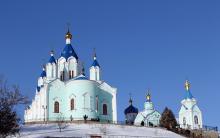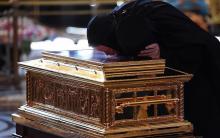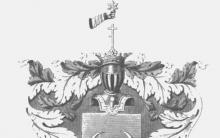Today, most citizens consider February 23 - Defender of the Fatherland Day - as the day of real men. On this day, everyone who is related to military service is officially congratulated, and not officially - the entire male population of the country is honored and congratulated. This is a men's holiday when men rightfully accept gifts, congratulations and gratitude!
There are several versions of the origin of the holiday and the rationale for the date of its celebration.
According to one version, in connection with the resumption of hostilities by German and Austro-Hungarian troops, the Council of People's Commissars on January 28, 1918 published a Decree on the creation of the Workers' and Peasants' Red Army. The idea of celebrating the anniversary of the creation of the Red Army arose in 1919 and was scheduled for February 23. But, as historical documents testify, they were unable to prepare for the celebration in time. The official celebration took place only in 1922. On this day, a military parade led by Trotsky took place on Red Square, which laid the tradition of the annual national celebration.
According to another version, in order to justify the date of the holiday, Stalin in 1938 proposed to interpret the battle of Pskov and Narva on February 23, 1918 as decisive resistance by the Red Army, despite the fact that the true course of historical events was completely different. February 23 was declared the birthday of the Red Army and named “Victory Day of the Red Army over the Kaiser’s troops in Germany in 1918.”
In fact, on February 23, 1918, the Red Army did not win, but lost its first battles to the Kaiser’s troops in Germany. In 1938, Stalin, in his “Short Course on the History of the All-Union Communist Party (Bolsheviks),” outlined a different version of the origin of the date of the holiday, which was absolutely unrelated to the decree of the Council of People’s Commissars of January 15 (28), 1918.
The “Short Course...” stated that in 1918, near Narva and Pskov, “the German occupiers were given a decisive rebuff. Their advance to Petrograd was stopped. The day of repulse to the troops of German imperialism—February 23—became the birthday of the young Red Army.”
As historical documents indicate, this was partly true. The fighting near Pskov began on February 23, 1918. Then the Red Army soldiers thwarted the Germans’ attempt to capture Pskov on the move. Only in the evening of February 24, under the cover of large-caliber guns, the Germans broke through the defenses of our troops. A week before, on February 18, 1918, Austro-German and Turkish troops, violating the truce that was concluded on December 2 (15), 1917, invaded Soviet Russia and began occupying Ukraine, Belarus and the Baltic states. On February 21, 1918, German troops captured Minsk. On February 23, the Germans sent a telegram to Lenin (issued an ultimatum) demanding that he accept their conditions within 48 hours. The Bolsheviks did not wait so long and on the morning of February 24, Lenin telegraphed to Berlin: “The Council of People's Commissars decided on the peace conditions proposed by the German government, to accept and send a delegation to Brest-Litovsk.” On March 3, the Brest Peace Treaty was signed, according to which Belarus was given to the Germans. The Germans left Minsk only in December 1918, when Germany capitulated to Western countries. Thus, on February 23, 1918, Belarus was under German occupation. Therefore, February 23 is, rather, a kind of sacred symbol for Belarus, which is associated with the creation and action of the Workers' and Peasants' Red Army, which saved humanity from fascism. On this day we pay tribute to everyone who gave their lives for their Motherland and who, with their unparalleled heroism, defended the right of the Belarusian people to freedom and the opportunity to be masters of their native land.
In 1923, an order was issued according to which the holiday on February 23 began to be called “Day of the Red Army and Navy.” The holiday in the USSR was highly revered and respected, although it was not a day off.
In 1946, this holiday was renamed “Day of the Soviet Army and Navy.” In Soviet times, only military personnel and everyone who worked in a military organization had the right to have a day off on February 23.
Currently, the holiday is celebrated as “Day of Defenders of the Fatherland and the Armed Forces of the Republic of Belarus.” This day is rightfully considered a national holiday in our republic, a day of remembrance of the courage and heroism of all generations of defenders of the Fatherland who defended the independence of their native land.
We congratulate you today:
Men, defenders, heroes and soldiers.
We will never wish you war,
Loss, bitterness, sadness and loss.
May many of you not fight
And some don't even know how to shoot
We love you even without medals.
It's not important for men to fight.
And let it be like a reward for you
In all ages and times:
Those women who are next to you
And loyal, reliable friends!
Peaceful sky, personal happiness,
True friends and a brilliant career!
February 23 is the Day of Defenders of the Fatherland and the Armed Forces of the Republic of Belarus. This year the country is also celebrating the centenary of the army.
Recently, Defense Minister Andrei Ravkov explained why the centenary of the Armed Forces is celebrated in Belarus in 2018.
This is quite natural. The Belarusian people cherish their history, and the brightest, fateful pages of more than a thousand years of history of the people of Belarus are connected precisely with the twentieth century,” explained Lieutenant General Andrei Ravkov. - Objectively, the Republic of Belarus has become the spiritual successor of all the best that was in the Soviet Union.
In our history, one of the most striking dates was and remains the date of February 23 - the Day of Defenders of the Fatherland and the Armed Forces.
This is the date of birth in 1918 of the Workers' and Peasants' Red Army. An army that was a decisive factor for the protection and, essentially, preservation of the Belarusian people in the harshest conditions of the twentieth century.
The date of February 23 is associated with the creation of an army that ensured the reunification of the great Belarusian people in a single Belarusian state. This is exactly what is said in the Law of the BSSR of November 14, 1939 - the great Belarusian people.
The date February 23, 1918 is associated with the creation of the Red Army, which saved humanity from fascism. The greatest feat of the Belarusian people, who made a significant contribution to the defeat of the enemy of humanity both as part of the Red Army and during the unrivaled popular resistance to the invaders in the temporarily occupied territory, is recognized by the international community - the Belarusian SSR is the founder of the UN.
Photo: Olga Shukaylo, TUT.BYThe date of February 23 is associated with the birth of the army, which made a decisive contribution to maintaining strategic parity on the planet in the second half of the twentieth century. The Soviet army was the main argument that made a major war, including a nuclear missile war, impossible and irrational in the second half of the twentieth century. A huge role in maintaining strategic parity at that time belonged to the Red Banner Belarusian Military District.
Created on the basis of the Red Banner Belarusian Military District, the Armed Forces of the sovereign independent state - the Republic of Belarus were the successor to all the best that was in the Soviet army, and in modern conditions they reliably ensure peace and stability on Belarusian soil.
Therefore, it is quite natural that February 23 is a bright date in our history, symbolizing the greatest feats for the glory of the Fatherland,” Ravkov noted.
The total strength of the Armed Forces of Belarus is almost 65 thousand people, of which 46,482 are military personnel (as of January 1, 2018). This is 6 times more than Lithuania (10,640 people), 11 times more than Estonia (5,500 people) and Latvia (5,100 people), and almost 2 times less than Poland (more than 120 thousand people). ).
There is conscription in Belarus. Military service by conscription is compulsory military service for male citizens recognized as fit to perform it.
In 2016, about 20 thousand people served in compulsory military service, and about 3,000 people served in the reserves. In 2017, respectively: 21 thousand and 2500.
It is believed that this holiday was started in 1918 as the Birthday of the Red Army to commemorate the victory over the German conquerors near Narva and Pskov.
It was established as an official holiday in the RSFSR on January 27, 1922. The Presidium of the All-Russian Central Executive Committee of the RSFSR published a resolution on the fourth anniversary of the Red Army, which stated: “In accordance with the resolution of the IX All-Russian Congress of Soviets on the Red Army, the Presidium of the All-Russian Central Executive Committee draws the attention of the executive committees to the upcoming anniversary of the creation of the Red Army (February 23)”, - report open Internet sources.
Initially, the holiday was called Red Army and Navy Day. From 1946 to 1993 it was called the Day of the Soviet Army and Navy.
In modern independent Belarus, February 23 is considered a national holiday and is not a day off. In our country it is called the Day of Defenders of the Fatherland and the Armed Forces of the Republic of Belarus.
After the collapse of the USSR, the holiday also continues to be celebrated unofficially in a number of other CIS countries: Russia, Tajikistan and Kyrgyzstan.
What does this date mean for Belarus?
On this day in 1918, our country was under German occupation. Journalist Vladimir Bogdanov, who researches the history of the First World War, several years ago in an interview with Salidarnasts, expressed his indignation at the tradition of celebrating February 23 in independent Belarus: “I believe that February 23 is one of the most ridiculous and even, I would say, shameful holidays for Belarus. Of course, there should be Defenders of the Fatherland Day. But not February 23rd! We need to face the facts. Of course, the date of February 23 is connected with the history of Belarus. But how?
On December 4, 1917, in the town of Soly near Smorgon, the Germans and Bolsheviks concluded a truce on the Eastern Front. It came into force on December 15 and was valid for two months. At the end of the period, the pedantic Germans rose from the trenches and began to attack. But no one met them. On February 21, 1918 they occupied Minsk.
On February 23, the Germans sent a telegram to Lenin demanding that he accept their terms within 48 hours.
The Bolsheviks did not wait so long, and already on the morning of February 24, Lenin telegraphed to Berlin: “The Council of People's Commissars decided on the peace terms proposed by the German government, to accept and send a delegation to Brest-Litovsk”. On March 3, the Treaty of Brest-Litovsk was signed, according to which Belarus was given to the Germans.
They left Minsk only in December 1918, when Germany capitulated to Western countries.
By the way, there is a version that the holiday of February 23 was invented by the Bolsheviks so that people would not celebrate the February bourgeois-democratic revolution, which began on February 23, 1917 and during which the monarchy was actually abolished.
A different opinion about the situation with the date February 23 in the same interview with Salidarnasts in 2013 was expressed by the head of the information department of the Ministry of Defense, Colonel Vladimir Makarov: “February 23 is associated with the creation and action of the Workers 'and Peasants' Red Army, which saved humanity from fascism. It is symbolic that in our country, with the election of Alexander Grigorievich Lukashenko as President in 1994, a powerful impetus was given to revive the meaning of this victory, which brought salvation to humanity. This greatest feat, as well as the liberation of Minsk on July 11, 1920 and the liberation of Minsk on July 3, 1944, are associated with the Red Army.
The decree on the creation of the Workers' and Peasants' Red Army was signed on January 15, 1918. But the date February 23 is a sacred date, a sacred symbol. Therefore, we take it as a reference".
Mikhail Strelets, professor, doctor of historical sciences, believes that in February we should celebrate the anniversary of the February Revolution, and not the Day of Defenders of the Fatherland.
– This date is purely artificial for Russian, and even more so for Belarusian history. On February 23, 1918, no one defeated the Germans near Narva and Pskov. This is a myth of Soviet historiography. The myth has been completely debunked. On February 23, 1918, the Germans controlled our domestic Belarusian territory to the west of the line Minsk - Postavy - Baranovichi - Pinsk. No one cleared the Belarusian land from the Germans that day. The question arises: what is the significance of the date February 23?
We just need to thank our dear women for coming up with a holiday for us men. But there is no need to falsify history. This is harmful, dangerous and short-sighted.
Regarding the fact that the Bolsheviks came up with February 23 so that people would not celebrate the February Revolution, I do not have such information. But I believe that the time has come when it is necessary to celebrate the Day of the February Revolution at the state level throughout the entire post-Soviet space. Just like a holiday of democracy, a holiday of democracy. For the democracy that the February Revolution gave, even in modern Russia, by and large, does not exist. This is an epoch-making event. And it would be right if it were celebrated this year on the 100th anniversary of the February Revolution. This is a fundamental event. But there is no need to celebrate February Revolution Day on February 23 either. The apogee of this revolution was the abdication of the king on February 28, but another thing is that the key events that were directly adjacent to this revolution began on February 23. Of course, these six days from February 23 to 28 radically changed the face of Russia. And this is very important in the sense that it was a people's movement, a people's choice without the influence of political parties. They will only score points later, but during the February Revolution their role was very weak, almost unnoticeable.
Historically, the Day of the Belarusian Army should be celebrated on September 8, because on this day in 1514 the outstanding victory of Konstantin Ostrozhsky near Orsha was won. But another thing is that there are political considerations here. He defeated the army of the Moscow prince, which was three times larger than the Belarusian army. And, of course, some here want to point out the difficulties in Russian-Belarusian relations if this date is celebrated. But they are celebrating the victory at Stalingrad, but where are the difficulties in Russian-German relations?
History is history, so it must be approached objectively and without unnecessary emotions that are not necessary.
In 2018, February 23 will mark the 100th anniversary of the founding of the holiday dedicated to all defenders of Belarus. Defenders of the Fatherland Day acquired its usual name in 1993, but its essence has remained unchanged for a hundred years: to give memory and respect to everyone who risks their lives for the sake of a peaceful sky above their heads.

The role of Belarus in the Great Patriotic War
The Second World War was the largest battle in the entire history of mankind and the contribution of Belarus was disproportionately large. Every third Belarusian took part in hostilities, which lasted more than 3 years. The losses are staggering: out of 270 cities, 209 were destroyed or looted, more than 5,000 villages were destroyed. Many military subjects formed the basis of the paintings Belarusian artists of those years.
![]()
![]()

The Belarusian land was occupied, but this did not prevent the creation of the largest underground partisan movement in Europe. Thanks to him it was possible to carry out dozens of successful battles against the enemy and help not only soldiers, but also civilians. By the end of 1943, the partisan movement controlled more than 60% of the occupied territory. In addition, there were about 1,200 partisan detachments, which included more than 300 thousand courageous soldiers.
![]()
![]()

For three years heroic struggle behind enemy lines (from June 1941 to July 1944) partisans and underground workers accomplished many feats :
- Killed and wounded about half a million German occupiers and their collaborators
- Destroyed 11,128 enemy trains and 34 armored trains, destroyed 29 railway stations, 948 enemy headquarters and garrisons
- They blew up more than 18,700 cars, more than 300 thousand rails, blew up and burned 819 railway and 4,710 other bridges, destroyed over 7,300 km of telephone and telegraph communication lines
- They shot down 305 aircraft, knocked out 1,355 tanks and armored vehicles, destroyed 438 guns of various calibers, and 939 military warehouses.
Subsequently, thousands of soldiers, commanders and generals received ranks Hero of the Soviet Union.
The exploits of Belarusians in the Second World War
Lev Mikhailovich Dovator (born February 20, 1903, native of the Beshenkovichi district) - commander of the famous cavalry corps, which courageously defended the Soviet Union. None of the opponents could predict Lev Mikhailovich’s attack strategy.
![]()
![]()

His cavalry destroyed enemy headquarters and garrisons, blew up bridges, destroyed communication lines, and helped liberate villages and cities. The Cossacks called him their favorite general and composed songs about the legendary Dovarov. The German fascists, trying to take revenge on Lev Mikhailovich, completely burned his native village. They even offered a reward unimaginable at that time for his capture - 100 thousand Reichsmarks.
Tankman Gabriel Antonovich Polovchenya (date of birth 1907) deservedly received the title of Hero of the Soviet Union, he commanded a special tank battalion, which became famous during the liberation of the occupied Belarusian land.
![]()
![]()
 One day, Captain Polovchenya’s tank broke away from his battalion and on January 11, 1942, alone broke into the village of Lugi, where a German regiment was resting. Using a cannon, a machine gun and tracks, the tank crew destroyed 2 anti-tank guns, 6 mortars, 3 heavy machine guns, 97 wagons with ammunition and other military equipment.
One day, Captain Polovchenya’s tank broke away from his battalion and on January 11, 1942, alone broke into the village of Lugi, where a German regiment was resting. Using a cannon, a machine gun and tracks, the tank crew destroyed 2 anti-tank guns, 6 mortars, 3 heavy machine guns, 97 wagons with ammunition and other military equipment.
Khoruzhaya Vera Zakharovna born on September 14, 1903 in the city of Bobruisk. This brave and courageous woman, awarded the title of Hero of the Soviet Union, was a partisan and fought with enemies until the last minute of her life.
![]()
![]()

She has years of Polish prison and torture in Germany behind her. Despite this, her exploits are forever captured in historical chronicles. Even during her lifetime, Vera Zakharovna was the idol of Soviet youth, being a model of courage and intelligence.
Where to celebrate February 23 in Minsk
![]()
![]()

We have compiled a list of the best pubs and restaurants where you can celebrate Defenders of the Fatherland Day. A varied menu, a decent alcohol menu and unobtrusive music - all this awaits you in the establishments from our selection.
- Cafe "Pivnyary" ( st. Lobanka, 77|/vk.com/pivnary)
- Bar "The Pub" ( st. Karl Marx, 6|vk.com/thepubminsk)
- Restaurant "Vinograd" ( st. Lobanka, 77)
- Restaurant "Gambrinus" ( pl. Svobody, 2 | gambrinus.by)
- Bar "Bar 13" ( st. Red, 13 | vk.com/bar13minsk)
- Restaurant "Gvozd" ( st. Timiryazeva, 65 | pubgvozd.by)
- Cafe "Skif" ( Independence Avenue, 34|cafeskif.by)











People who have overcome cancer? How to beat cancer? Why humanity will never be able to defeat cancer And thereby defeat cancer
How to find out when I will get pregnant by date of birth
Major Arcana Tarot Tower: the meaning of the upright and inverted card
Removing a lapel from yourself and your loved ones How to remove a lapel from money
Unction - a sacrament that heals soul and body